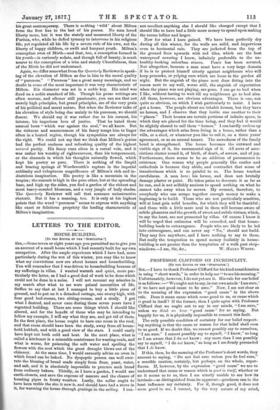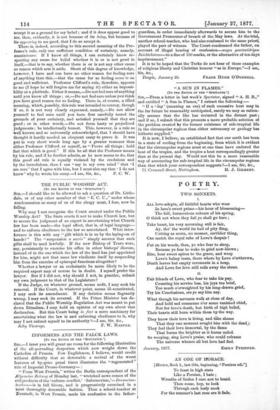PROFESSOR CLIFFORD ON INCREDULITY.
(TO THE EDITOR OF THE " SPEOTATOR.9 have to thank Professor Clifford for his kind consideration in using "short words," in order to help me "to see his meaning." Unfortunately, however, I do not yet see it. His rule for our belief is as follows :—" We ought not to say, in our own minds 'Jam sure,' if we have not good cause to be sure." Now, I am not clear as to the meaning of the expression "good cause" in the above rule. Does it mean cause which seems good to us, or cause which is good in itself? If the former, then I quite agree with Professor Clifford that we ought not to say in our minds, "Jam sure," unless we think we have "good cause" for so saying. But happily for us, it is physically impossible to commit this fault.
The only possible condition of certainty for our belief respect- ing anything is that the cause or reason for that belief shall seem to us good. If we doubt this, we cannot possibly say to ourselves, "I am sure." I cannot possibly say to myself, "I know," so long as I am aware that I do not know ; any more than I can possibly say to myself, "I do not know," so long as 1 am firmly persuaded that I do know.
If this, then, be the meaning of the Professor's short words, they amount to saying, "Do not feel sure unless you do feel sure," a sensible caution, certainly, but perhaps, on the whole, super- fluous. If, however, by the expression "good cause" we are to understand that cause or reason which is good in itself, whether or no it seems so to us, then I am utterly unable to see how its intrinsic—as distinguished from its apparent—goodness can in the least influence my certainty. For if, though good, it does not seem good to me, I cannot, by the very nature of my mind,
accept it as a ground for my belief ; and if it does appear good to me, then, evidently, it is not because of its being, but because of its appearing to me good, that I do so accept it.
There is, indeed, according to this second meaning of the Pro- fessor's rule, only one sufficient condition of certainty, namely, omniscience. If I know all things, I can certainly know re- specting any cause for belief whether it is or is not good in itaelf,—that is to say, whether there is or is not any other cause or reason which sets it aside. Short of this degree of knowledge, however, I have and can have no other reason for feeling sure of anything than this,—that the cause for so feeling seems to me good and sufficient. Professor Clifford's rule, therefore, appears to me (I hope he will forgive me for saying it) either an impossi- bility or a platitude. Either it means,—Do not feel sure of anything until you know 811 things ; or,—Do not feel sure unless you think you have good reason for so feeling. There is, of course, a aird meaning, which, possibly, this rule was intended to convey, though if so, it is not very clearly expressed, namely,—Do not allow yourself to feel sure until you have first carefully tested the grounds of your certainty, and satisfied yourself that they are good ; or in other words,—Do not form hasty or prejudiced judgments ; be intellectually honest. This, however, is a rule so well known and so universally acknowledged, that I should have thought it hardly needed an eloquent essay to prove it. It was put in very short words long ago by a greater reasoner than either Professor Clifford or myself, as "Prove all things ; hold fast that which is good." If this be all that the Professor means by his rule, and if he further admits, as he now seems to do, that this good old rule is equally violated by the credulous and by the incredulous, then I can "say in my own mind" that am sure' that I agree with him, but I must also say that I do not know' why he wrote his essay.—I am, Sir, &c., P. C. W.



































 Previous page
Previous page